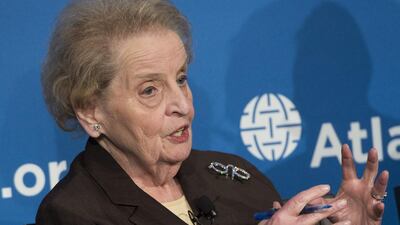It was the launch of the Middle East Strategy Task Force and the Atlantic Council asked me to present a report on how Arab public opinion views the challenges facing the region and how the US could address these concerns. The Task Force’s goal, according to its co-chairs, former secretary of state Madeleine Albright and former national security adviser Stephen Hadley, will be to develop a long-term US strategy to assist the Middle East achieve stability and prosperity.
One might take a jaded view and see it as just another election-year effort by a Washington think tank to develop a policy paper that will, in the end, be nothing more than a restatement of conventional wisdom and existing policy. What I believe sets this project apart is the stated resolve of the co-chairs to ground their work in the views and needs of the Arab people. Instead of projecting policies developed in Washington for the people of the region, the Task Force intends, as a starting point, to ascertain what the people of the region say they need and then craft policies that meld America’s interests and capacity with Arab aspirations.
It is evidence of its seriousness that it has formed five working groups, two of which are headed by respected Arab American scholars. The recommendations that emerge will be considered in the Task Force’s final report.
I titled my presentation Confounded, Lacking Confidence, and Conflicted, three terms which I felt described Arab attitudes toward the traumatic changes that have rocked the region; their loss of faith in America’s capacity to “do the right thing” when it comes to Arab affairs but their desire to maintain good relations with the US.
Zogby Analytics’ polling shows that Arab opinion is largely confounded when it comes to assessing the region’s current crises. They know where they want to be, but they don’t know how to get there. Poll after poll of Egyptians, for example, demonstrates that they want jobs, improved educational opportunities and a better health care system. They also rank corruption as a key concern. In short, they want clean government that delivers services and meets their needs. What confounds them is this: how to get there.
Iraqis want much the same from their government. Strong majorities of all Iraqi subgroups reject ISIL and also express concern about growing Iranian influence. They do not want their country to fragment and they want the central government to represent all Iraqis and provide for them but they do not know how to get there. Similarly, majorities reject ISIL, Al Qaeda and the regime in Damascus and express concern that Syria may fragment along sectarian lines. But because they do not support western-led military intervention in Syria to defeat ISIL, the question remains the same: how to get from where they are to where they want to be?
Any American effort to formulate policy options has to consider the Arab publics’ conflicted attitude towards the US. What comes through in our polling is that while Arabs have strongly favourable views of the American people, values, culture and products, they resent American policy in the region very deeply. When we ask Arabs to name the “greatest threats to peace and stability” in their region, every poll we have conducted in the past 15 years has these answers: the unresolved Israeli-Palestinian conflict and “US interference in the Arab world”. This is only to be expected, given the disastrous Iraq war and continuing support for Israel.
When we ask Arabs, in repeated polls, to identify the areas where they feel the US can be most helpful, they suggest helping with job creation and improved education and health care. But at the top of the list will always be “resolve the Israeli-Palestinian conflict”. In other instances, however, Arabs will say that the US should“leave us alone”, which indicates how conflicted they are.
Even so, Arabs do not want to write off the US. When we ask “how important is it that your country have good relations with the US”, substantial majorities say they are important. And yet there is obvious disappointment and a lack of trust in America’s ability to deliver. Arabs believe that the US has the capacity to end the Israeli occupation of Palestinian lands, help end the war in Syria and help make positive changes in their region.
I have long argued that public opinion matters. Any American effort to successfully engage the Arab world must listen to what Arabs are saying – even if it doesn’t like what it hears. And any effort to assist the region must be demand-driven. Given the lack of confidence in the US and the conflicted attitudes towards it, meaningful policy changes will be like threading a needle. But because the new Task Force has made Arab opinion the starting point of its efforts, I am optimistic that it may succeed where others have failed.
James Zogby is the president of the Arab American Institute
On Twitter:@aaiusa


